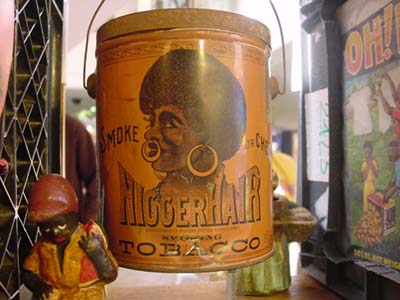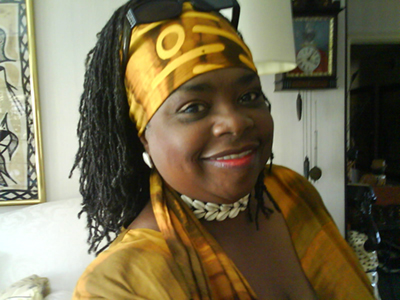

Reminiscence Of The Past Can Inspire A Family’s Present and Future!
Gail Deculus-Johnson has been championing the cause of equality for over two decades. She is a Black memorabilia enthusiast, collector for 20 years, and owner of Sable Images, Inc.–specializing solely in African-American memorabilia, antiques and collectibles. “Honoring our past, celebrates our future,” Gail advocates, “we owe it to our ancestors/forefathers and to the sacrifices they made, to continue to achieve higher goals, while maintaining our identity. Even in the midst of our worst struggles, our forefathers knew that part of our advancement and growth began with a sound education.” Gail states that she established Sable Images, Inc. in 1991 with the hope of raising historical consciousness of Africans Americans. She turned an immense hobby into a business. She conveys, “I had to start selling items to support my habit.” She also states another primary reason for establishing the business was to create awareness and educate–allowing people to feel a part of not just Black history, but American history.
Adverse circumstances have made Black memorabilia and folk art rare, this rarity is what is prized by collectors and inspires African Americans (young and old) to pursue collecting. Sable Images exhibitions offer a service to those who appreciate African-American memorabilia, also referred to as “Black Americana.” “We collect controversy,” Gail said, emotionally charged items with a pictorial record of the long, bitter struggle for equality–from enslavement, malignant treatment and benign neglect to the movement of Marcus, Medgar, Martin, Malcolm and other Black icons. Thousands of authentic objects are collected, exposing powerful evidence of the most important social movement in America. African-American memorabilia clearly documents an evolution through Black imagery. Gail asserts that it is also depicted through an enormous number of items dating back to the 1700’s, the irrefutable facts of man’s inhumane treatment of man and the Jim Crow structural and institutional racist system. Gail believes that the roots and lasting impact of the institution of enslavement was an everyday part of life in the U.S. and its legacy continues to influence and shape America.
Gail acknowledges that from the signing of the Declaration of Independence to the beginning of the civil war, Blacks contributed to the development of the arts-and-crafts tradition of America. However, all too often, neither the creator nor their work was known, since the Black artists were unattained in the art-academy sense, he or she was seldom known by other artists. The individual was also unknown by the art-buying public. Generally, the creations by Blacks were mostly intended for his/her own home, yard, and work space or were given to friends. The creative and artistic talents of most African Americans were overlooked and unrecognized. Gail asserts that horrific, authentic artifacts relating directly to Blacks or depictions of them (created by non Black people) were often destroyed or discarded in a concerted effort to erase their presence.
The extensive accumulation of Black memorabilia is what makes seeing a display by Sable Images an extraordinary experience. “We must share,” Gail said, “giving a gift of history is something wonderful to receive.” The founder of Sable Images believes that ignoring African-American memorabilia today means the loss of a rich part of our history and fosters continued prejudice. Gail adamantly declares that we must never go back, we must not ignore our past, no matter how negative it was or painful it may be.
Nationally known, Sable Images, Inc. provides an extraordinary collection of “signs of times gone by,” exposing a pictorial review of the “good, bad and ugly.” The Sable Images’ collection takes a broad look at the material culture that has grown out of the history of racial perceptions and misperceptions of African Americans in America and around the world. Through Sable Images’ superb exhibition, youth and adults of diverse cultures will see firsthand a view of contributions and life experiences of African Americans that “his-story” books do not tell and/or omitted from our educational system.
Gail expressed, “I went through the educational system earning a MBA, but never exposed to the true history that I have obtained through the treasures of information gather from collecting Black memorabilia.” She has found artifacts that reveal graphically striking, shocking, nerve shattering, heart rendering, and imperative historical memorabilia and folk art (i.e. historical advertisements, slave shackles, slave documents, original figurines, cookie jars, salt and pepper shakers, unique albums, odd magazines, confederate bills, ethnic tablecloths, cast iron banks, rare dolls and toys, nostalgic tin signs, heritage books, primal post cards, classic statues, as well as sports and music items). These commemoratives along with other contemporary ethnic items encompass the nostalgic ambiance of the Sable Images experience. Most artifacts collected, which have been preserved for many years, have been gathered from Gail traveling to cities across the U.S. and other countries (including Africa several times).
The efforts of Sable Images strive to increase awareness that Black artifacts are a great way to start family legacies, air looms, and investments. Gail suggested that if we look back 40 years, one could usually determine the ethnic heritage (i.e. Asian, Spanish, etc.) of a home by observing the artifacts and adornments decorating the home. However, there is one exception to that theory, African Americans. In past years, typically Black people did not decorate their home with images that reflect their heritage and culture. Generally, nor did our grandparents or great grandparents talk about their painful past.
When asked the question, why should I show my children these politically incorrect depictions, is this teaching racism? Gail’s reply was that displaying memorabilia as part of a home, no matter how offensive it may seem, is ensuring that “each one teach one”; and that history must not repeat itself. America’s youth “must know where we have been, to know where we are going.” African-American forefathers of this country must be given the recognition they deserve. Portrayals that people may now view as racist, negative, derogatory or discriminatory must be seen in a historical perspective. It is imperative that we appreciate and preserve Black heritage and consciousness, as well as re-shape perceptions of youthful minds for greater contributions from future generations. Black images can be found in practically every collecting category–dolls, toys, quilts, ephemera, clocks, sports, music, tobacco, fine art, sculptures, kitchen items–the list is endless. Gail shares that the entire decor of her home decorations are Black memorabilia. “Living with the souls of my people is inspiring and uplifting for me,” she said. Sharing Gail’s passion, there appears to be an increasing marketplace for Black Americana. “There are many prominent African Americans known for their prodigious collections of Black memorabilia, that many would still view as offensive, include: Whoopi Goldberg, Julian Bond, Anita Baker, Lionel Richie, Gladys Knight, James Avery and Oprah Winfrey to name a few,” Gail revealed.
After twelve years as a pillar business in the Los Angeles community, Sable Images closed its doors on Crenshaw in January 2010. Gail will, however, continue to be dedicated to collecting, preserving, and exhibiting artifacts that provide African-American images over a 300 year period of American history. Gail maintains that Sable Images will continue to sell memorabilia through community events and on the internet through the Sable Images E- Store; visit www.sableimages.com and her Sable Image Face Book for additional services, exhibits, and great discounts. The phone number is 323 293 1265 and the email address is [email protected].
In honor of supporting small businesses, The Sentinel news paper’s office on Crenshaw is exhibiting Sable Images’ memorabilia. Individuals seeking to know the past to better understand the future are invited to purchase Sable Images artifacts displayed in our office through December 29, 2010. The display comprises a powerful exhibit; come to The Sentinel office and feel history; celebrate a rich Black heritage and witness how Black memorabilia makes history come alive. You can own a part/piece of history!






